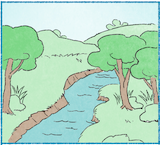
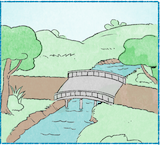
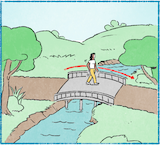
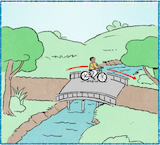
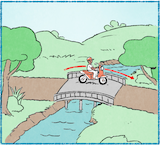
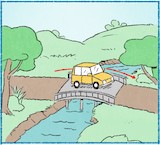
นี้คืออี่หยัง นี้คือแม่น้ำ แม่น้ำสายบักญาวหนึ่ง
อยู่ข้างแม่น้ำกะมีต้นไม้พ้อม มีต้นไม้ต้นบักใหญ่หนึ่ง มีบักหลายต้น
แล้วกะมีหญ้าพ้อม หญ้ากะเกิดอยู่ข้างต้นไม้ แล้วหญ้ากะเกิดอยู่ข้างแม่น้ำพ้อม
หญ้ามีหลายต้นบ่ มีหลายอยู่ หญ้ามีหลายต้น หลายบักคักหนึ่ง
แม่น้ำสายนี้ข้ามได้บ่ บ่ แม่น้ำสายนี้ข้ามบ่ได้ เพาะว่ามันบ่มีสะพานให้ข้าม มันกะเลยข้ามบ่ได้ เฮากะเลยบ่สามาดข้ามแม่น้ำนี้ได้
แม่น้ำสายนี้ไหลไปใส บ่ลู้คือกันจักว่าแม่น้ำสายนี้ไหลไปใส อาดสิไหลไปทะเล หลือไหลไปนำคองใหญ่ๆ กะได้
10
นี้คืออี่หยัง นี้คือแม่น้ำ แม่น้ำสายบักใหญ่หนึ่ง สายญาวพ้อม
อยู่ข้างแม่น้ำกะมีหนทางพ้อม มีหนทางสายบักญาว มีหนทางบักใหญ่หนึ่ง
แล้วแม่น้ำสายนี้มีสะพานเซี้ยมหนทาง เพื่อที่ใซ้ข้ามแม่น้ำสายนี้
สะพานมันอันใหญ่บ่ ใหญ่อยู่ สะพานมันใหญ่หลาย มันใหญ่บักคักหนึ่ง
สะพานอันนี้มันสามาดข้ามแม่น้ำสายนี้ได้ มันกะเลยอันบักใหญ่หนึ่ง
สะพานอันนี้มีละเบียงพ้อมแม่นบ่ แม่น สะพานอันนี้มีละเบียงพ้อม สะพานอันนี้มีละเบียงอยู่
อยู่ขอบสะพานมีละเบียงพ้อม เพื่อที่สิให้คนญ่างไปญ่างมา เพื่อที่สิได้จับฮั้วหลือละเบียงสะพานนี้
แล้วอยู่เทิงหนทางนี้ บ่มีคนอยู่เลย บ่มีใผอยู่หนี้จักคนเลย
11
เขากำลังเฮ็ดหญัง มีพุหญิงพุหนึ่ง เขากำลังญ่างข้ามสะพาน จักว่าเขาสิญ่างไปใส เขากำลังญ่างข้ามสะพานอันนี้ไป
เขากำลังญ่างไปพุเดียว บ่มีพุใดอยู่กับเขาเลย
เขามาแต่ใส บ่ลู้คือกันจักว่าเขามาแต่ใส แต่ว่าเห็นเขาญ่างมาแต่ทางหลัง แต่บ่ลู้ว่าเขาญ่างมาแต่ใส
แล้วเขาสิญ่างไปใส บ่ลู้คือกันจักว่าเขาสิญ่างไปใส เห็นแต่เขาญ่างข้ามสะพานนี้ซื่อๆ
12
เขากำลังเฮ็ดหญัง มีเด็กน้อยพุหนึ่ง เขากำลังถีบจักกะย๊าน
เขาถีบจักกะย๊านไปทางหน้า เขากำลังถีบจักกะย๊านข้ามสะพาน
จักว่าเขาสิไปใส กะบ่ลู้นำเขา เห็นเขาถีบอยู่พุเดียว
ตอนนี้เขาข้ามสะพานไป่ บ่ เขาบ่ทันได้ข้ามสะพานเลย ตอนนี้เขากำลังถีบจักกะย๊านอยู่เทิงสะพาน
เขาอาดสิเป็นเด็กน้อย เขากะเลยไปค่อยๆ เขาอาดสิบ่ถีบจักกะย๊านเล็วกะได้
จักกะย๊านอันนี้มีสองล้อแม่นบ่ แม่น จักกะย๊านอันนี้มีสองล้อ
13
เขากำลังเฮ็ดหญัง มีพุซายพุหนึ่ง เขากำลังขับมอเตอไซ เขากำลังขับมอเตอไซไปทางหน้า จักว่าเขาสิไปใส ตอนนี้เขากำลังขับมอเตอไซขึ้นสะพาน กำลังข้ามสะพาน จักว่าเขาสิไปใส
ตอนนี้เขาข้ามสะพานไป่ บ่ เขาบ่ทันได้ข้ามสะพาน เขากำลังขับอยู่เทิงสะพาน บ่ทันได้ข้ามสะพานไปทางหน้าอยู่
เขาขับมอเตอไซ มอเตอไซมันมีสองล้อ แล้วเขากะขับไปเลี้ยยๆ
เขาใส่หมวกกันน็อกพ้อม หมวกกันน็อกของเขาใบสีแดง ใบบ่ใหญ่ ใบอันน้อยๆ หนึ่ง
14
เขากำลังเฮ็ดหญัง เขากำลังขับลด ขับลดเก็ง ขับไปทางหน้า
เขาขับอยู่ใส เขาขับอยู่เทิงสะพาน ตอนนี้เขากำลังขับอยู่เทิงสะพาน กำลังสิข้ามสะพาน แต่ว่าบ่ทันได้ข้ามสะพานไป เขากำลังสิขับไปทางหน้า เขากะขับไปเลี้ยยๆ แต่ว่าบ่ทันได้ข้ามสะพานไป
ลดเก็งคันนี้มีจักล้อ ลดเก็งคันนี้มีสี่ล้อ
ลดเก็งคันสีเหลียง คันบ่ใหญ่ คันพอดี
คันบ่ใหญ่ คันบ่ใหญ่หลาย คันบ่น้อยหลาย คันพอดี
Link to overview page
Link to dictionary
| Isaan | Pronunciation | Tones | Thai | English/Notes |
|---|---|---|---|---|
| นี้ | ni: | HF | นี้ | 1. this 2. here |
| คือ | khʉ: | HR | คือ | 1. to be, to resemble, like, as 2. why {บักหล้าคือบ่เก็บโต่ะแน่ = [addressing a young boy] Why haven't you cleared the table?} |
| อี่หยัง | i:-yaŋ | H-M | อะไร | 1. what {นี้คืออี่หยัง = What is this?} {มื้อนี้เจ้าเฮ็ดอี่หยัง = What are you doing today?} {กินเข้างายกับอี่หยัง = What did you have for breakfast?} 2. something, anything, (in negations) nothing {บ่ต้องเฮ็ดอี่หยังอีกเลยนอกจากใส่ปุย = [we] don't need to do anything besides adding fertilizer} |
| แม่น้ำ | mɛ:-na:m | H-HF | แม่น้ำ | river |
| สาย | sa:i | M | สาย | 1. string, thread, wire, cord {หูฟังมีสาย = the headphones have a cord} {สายไฟ = power cord} 2. clf. for rivers, bus lines, phone calls {แม่น้ำสายนี้ข้ามบ่ได้ = you can't cross this river} {มีสายเข้า = there's an incoming call} |
| บัก | bak | M | 1. intensifier before adjectives {ปาโตบักใหญ่ = a (very) large fish} 2. prefix in front of fruits and vegetables {บักแตงโม = watermelon} 3. can be used as a reference for a male person of the same or younger age {บักอันนี้ = this lad} |
|
| ญาว | ɲa:o | HR | ยาว | long |
| หนึ่ง | nʉŋ | H | หนึ่ง | 1. one 2. after adjective: intensifier {บักคักหนึ่ง = very much} {อันบักใหญ่หนึ่ง = very large}, or attenuates the meaning {กะดาดมันแผ่นน้อยๆ หนึ่ง = the piece of paper is [relatively] small} |
| อยู่ | yu: | H | อยู่ | 1. to be (located) at 2. yet, still 3. auxiliary indicating continuous or progressive action {ทอดปาอยู่ในกะทะ = (in the process of) frying a fish in the pan} {แม่กำลังเมี้ยนเฮียนอยู่ = mother is cleaning/tidying up the house} |
| ข้าง | kha:ŋ | LF | ข้าง | 1. side {มีหูจับสองข้าง = there are handles on both sides} 2. next to {วางอยู่ข้างๆ ก่องใบใหญ่ = it's placed next to the large box} {เขายืนอยู่ข้างๆ อีกพุหนึ่ง = he's standing next to another person} 3. clf. for body parts which come in pairs (eyes, ears, legs etc.) {เขามีตาสองข้าง = she has two eyes} |
| กะ | ga | M | ก็ | 1. then, consequently 2. also |
| มี | mi: | HR | มี | 1. to have 2. there is |
| ต้นไม้ | ton-mai | HF-HF | ต้นไม้ | tree |
| พ้อม | phɔ:m | HF | พร้อม | at the same time, also, too {มีตะเว็นพ้อม = the sun's out, too} {กะทะมีด้ามพ้อม = the pan has also a handle} |
| ต้น | ton | HF | ต้น | 1. clf. for trees, plants, logs/pieces of wood {ต้นไม้ต้นใหญ่ = a large tree} {ต้นฟืน = log/piece of wood} 2. first, primary, initial {ลูกคนต้นหมู่ = first child} |
| ใหญ่ | ɲai | H | ใหญ่ | large, big |
| หลาย | la:i | M | เยอะ, มาก | many, much, very |
| แล้ว | lɛ:o | HF | แล้ว | 1. finished 2. already 3. and then, and next (especially แล้วกะ) 4. auxiliary for past tense |
| หญ้า | ɲa: | LF | หญ้า | grass |
| เกิด | gə:t | LF | เกิด | 1. (often together with ขึ้น) to happen, to arise, to take place {เกิดอี่หยังขึ้น = what is happening?} {บ่มีหญังเกิดขึ้น = nothing's happening} 2. to be born 3. to grow {หนวดกะคือสิเกิดอยู่ใต้ดัง = a moustache grows below the nose} |
| บ่ | bɔ: | H | ไม่ | 1. no, not 2. question particle, transforming a statement into a question Notes: spelling exception in line with common usage on social media |
| บักคักหนึ่ง | bak-khak-nʉŋ | M-H-H | intensifier: very, very much (variant of คัก) | |
| ข้าม | kha:m | LF | ข้าม | to cross {ข้ามสะพาน = to cross a bridge} {ข้ามทะเล = to cross the sea} |
| ได้ | dai | HF | ได้ | 1. can 2. to get, to obtain 3. before verb: indicating past tense 4. บ่ได้ + verb: not |
| เพาะว่า | phɔ-wa: | H-H | เพราะว่า | because |
| มัน | man | HR | มัน | it (also used to refer to people) |
| สะพาน | sa-pha:n | M-HR | สะพาน | bridge |
| ให้ | hai | LF | ให้ | 1. to give {หมอกำลังเอายาให้คนป่วยกิน = the doctor is giving the patient medicine} 2. for 3. to allow, to be allowed |
| เลย | lə:i | HR | เลย | 1. futher on, beyond, past {เข็มน้อยเลยเลขสิบสองไป = the minute hand has passed number twelve} 2. too much 3. at all 4. definitively 5. completely, utterly |
| เฮา | hao | HR | เรา | 1. personal pronoun: we 2. personal pronoun: I |
| สามาด | sa:-ma:t | M-HF | สามารถ | can, to be able |
| ไหล | lai | M | ไหล | to flow |
| ไป | pai | M | ไป | 1. to go 2. auxiliary indicating action extending into the future |
| ใส | sai | M | (ที่)ไหน | 1. where? {สิไปใส = Where are [you] going?} {มาแต่ใส = Where are [you] coming from?} {กะทะอยู่ใส = Where's the pan?} 2. somewhere, anywhere {ใสกะได้ = anywhere, wherever you like} |
| ลู้ | lu: | HF | รู้ | 1. to know 2. to understand Notes: equivalent to ฮู้ |
| คือกัน | khʉ:-gan | HR-M | เหมือนกัน | 1. also, likewise, similarly {ยินดีที่ได้ฮู้จักคือกันคับ = Nice to meet you too!} 2. in negative sentences: either {บ่ลู้คือกัน = I don't know either} {จักคือกัน = I don't know (either)} |
| จัก | jak | M | จัก | 1. answer to a question: [I] don't know, don't know exactly, [I'm] not sure {พุซายคนนี้เขาเถ้าไป่ จัก จักเถ้าหลือบ่เถ้า เบิ่งบ่ค่อยออก = Is this man here already old? I don't know. I can't see clearly whether he's old or not.} {เขาเว้ากันอยู่ใส จักคือกัน = Where are they talking? I don't know either.} 2. exact(ly), what exactly {จักต้มอี่หยังกะบ่ฮู้ = I don't know what (exactly) he is cooking} {บ่ลู้คือกันจักปาอี่หยัง = I don't know either what kind of fish this is} 3. how much/many? {ต้นไม้มีจักต้น = How many trees are there?} {ตอนนี้จักโมงแล้ว = What time is it now?} {มือของเฮานี้สิมีจักนิ้ว = How many fingers do our hands have?} 4. a bit, a little bit {จักหน่อย/จักหน่อยหนึ่ง = a bit, a little bit} |
| ว่า | wa: | H | ว่า | 1. that, as {คำว่า X = the word X} 2. to say |
| อาด | a:t | LF | อาจ | 1. might, may, will 2. likely |
| สิ | si | M | จะ | future tense auxiliary {เขากำลังสิตื่น = he's about to wake up} {สิไปตะหลาด = [I'm] going to the market} |
| ทะเล | tha-le: | H-HR | ทะเล | sea |
| หลือ | lʉ: | M | หรือ | or |
| นำ | nam | HR | 1. at, in 2. with, together with {บ่สามาดถือไปนำได้ = [you] can't carry it around} {กินบักแตงโมนำเฮาบ่ = Will you eat watermelon with me?} 3. to lead, to accompany, to go with {เด็กน้อยญ่างไปนำแม่ = the daughter follows her mother} |
|
| คอง | khɔ:ŋ | HR | คลอง | canal |
| หนทาง | hon-tha:ŋ | M-HR | ถนน | road, street, way |
| เซี้ยม | si:am | HF | เชื่อม | to connect, to join Notes: pronunciation: also realized as เชื้อม (HF) |
| เพื่อที่ | phʉ:a-thi: | H-H | เพื่อที่ | in order to, so that Notes: the vowel เอือ is likely to be a Thai loan |
| ใซ้ | sai | HF | ใช้ | to use |
| อัน | an | M | อัน | 1. thing, object 2. general clf. for objects |
| ละเบียง | la-bi:aŋ | H-M | ระเบียง | handrail |
| แม่นบ่ | mɛ:n-bɔ: | H-H | ใช่ไหม | question particle: ..., right? ..., isn't it? ..., don't you? etc. {เจ้าได้เห็นสิ่งนั้นแม่นบ่ = You've seen that, haven't you?} {ฝนกำลังตกแม่นบ่ = It's raining, isn't it?} {นี้คือกะคุแม่นบ่ = This is a bucket, isn't it?} |
| แม่น | mɛ:n | H | ใช่ | 1. yes 2. affirmative particle |
| ขอบ | khɔ:p | LF | ขอบ | edge, border |
| คน | khon | HR | คน | person, people |
| ญ่าง | ɲa:ŋ | H | เดิน | to walk {เขากำลังญ่างเว้ากัน = they are walking and talking} {ลูกเป็ดญ่างไปนำแม่เป็ด = the ducklings are [walking] following their mother} {เขากำลังญ่างข้ามสะพาน = she's walking over the bridge} {เขาสิญ่างไปใส = Where is he going?} |
| มา | ma: | HR | มา | 1. to come 2. auxiliary expressing action towards the present or focal time {กะคุเฮ็ดมาจากอี่หยัง = What is the bucket made of?} {แล้วเขากะเก็บเงินจากพุนั้นมา = and then she takes the money of that person} |
| จับ | jap | M | จับ | 1. to grasp, to hold {เขาจับมือกัน = they're holding hands} {เขายืนจับไอติมอยู่ = she's standing, holding an ice cream} 2. to catch, to arrest {จับพุล้าย = to arrest a criminal} |
| ฮั้ว | hu:a | HF | รั้ว | 1. fence 2. wall |
| เทิง | thə:ŋ | HR | บน | 1. on, on top of, at, in {เทิงโต่ะ = at/on the table} {กบมันนั่งอยู่เทิงใบบัว = the frog is sitting on the lotus leaf} {เทิงท้องฟ้า = in the sky} {มันแล่นอยู่เทิงลาง = [the train] runs on rails} {มีคนนั่งอยู่เทิงลดสามล้อสามคน = there are three people sitting in the tuk tuk} 2. up, upward Notes: pronunciation: also realized as ทัง |
| ใผ | phai | M | ใคร | 1. who {พุซายคนนี้เป็นใผ = Who's this boy?} 2. somebody, someone, anybody, with negative: nobody {บ่มีใผอยู่หนี้จักคนเลย = there's not a single person here} |
| หนี้ | ni: | LF | นี่ | here |
| เขา | khao | M | เขา | personal pronoun: he, she |
| กำลัง | gam-laŋ | M-HR | กำลัง | auxiliary indicating continuous or progressive action |
| เฮ็ด | het | H | ทำ | to do, to make |
| หญัง | ɲaŋ | M | อะไร, เป็นหญัง = ทำไม | 1. what {เขากำลังเฮ็ดหญัง = What is he doing?} {ธูปเอาไว้เฮ็ดหญัง = What are incense sticks for?} 2. something, anything, (nothing) 3. เป็นหญัง[...]คือ in initial position: why {เป็นหญังเขาคือใส่บักพิกลงไปในกวยเตียว = Why is he putting chili in [his] noodle soup?} {เป็นหญังหน้าต่างมันคือเปิด = Why is the window open?} {เป็นหญังมันคือมีควนไฟ = Why is there smoke?} |
| พุหญิง | phu-ɲiŋ | H-M | ผู้หญิง | woman, female |
| พุ | phu | H | ผู้ | 1. person 2. clf. for people {พุหญิงพุหนึ่ง พุซายพุหนึ่ง = a woman, a man} {ซู่พุซู่คน = everybody} {พุหนึ่งโตจ่อยๆ พุหนึ่งโตบักอ้วนหนึ่ง = one person is slim, the other is fat} Notes: pronunciation: also realized as พู่- |
| พุเดียว | phu-di:ao | H-M | คนเดียว | 1. alone, by oneself {เขากำลังยืนอยู่พุเดียว = she's standing by herself} {เขานั่งอยู่พุเดียว = he's sitting by himself} 2. one person |
| พุใด | phu-dai | H-M | ใคร | 1. who {มีพุใดโทมากะบ่ลู้ = I don't know who has called} {ห้องนอนของพุใด = whose bedroom (is this)? } 2. someone, somebody, anybody, in negative context: nobody {บ่มีพุใดอยู่กับเขาเลย = there's nobody with him} |
| กับ | gap | M | กับ | 1. and {ลุงกับป้า = uncle and aunt} {กวยเตียวหมูกับกวยเตียวไก่ = noodle soup with pork and noodle soup with chicken} 2. with, to {ค้ายๆ กับคำว่า ... = similar to the word ...} 3. prefix in front of foods {กับเข้า = side dishes eaten with rice} {เขากินกับกวยเตียว = he's eating noodle soup} |
| แต่ใส | tɛ:-sai | H-M | จากไหน | where from? |
| แต่ว่า | tɛ:-wa: | H-H | แต่ว่า | 1. but 2. only {ฮู้แต่ว่าเขายืนอยู่พุเดียว = I only know that he's standing there by himself} |
| เห็น | hen | M | เห็น | to see |
| แต่ | tɛ: | H | จาก | 1. from {มาแต่โลงเลียน = [I'm] coming from the school} {เห็นเขาญ่างมาแต่ทางหลัง = seeing him coming from behind, see also: แต่ใส} 2. since, ago {แต่โดนเติบ = long ago} |
| ทางหลัง | tha:ŋ-laŋ | HR-M | ทางหลัง | backward, at/on the back (of) |
| แต่ | tɛ: | H | แต่ | 1. but {แต่บ่ต่างกันหลาย = but not very different} {แต่บ่ลู้ว่าเขาญ่างมาแต่ใส = but [I] don't know where he's coming from, see also: แต่ว่า} 2. only {ตอนนี้มีแต่ขี้ฝ้า = now there are only clouds} |
| ซื่อๆ | sʉ: | H | เฉยๆ | 1. just so 2. so-so |
| เด็กน้อย | dek-nɔ:i | M-HF | เด็ก, เด็กน้อย | child |
| ถีบ | thi:p | LF | ถีบ | to pedal (e.g., a bicycle) |
| จักกะย๊าน | jak-ga-ya:n | M-M-HR | จักรยาน | bicycle |
| ทางหน้า | tha:ŋ-na: | HR-LF | ทางหน้า | forward, in front (of) |
| ตอนนี้ | tɔ:n-ni: | M-HF | ตอนนี้ | now |
| ไป่ | pai | H | หรือยัง | question particle: yet {เขาข้ามสะพานไป่ = Has he crossed the bridge yet?} {เขากินเข้าแล้วไป่ = Has he finished eating yet?} {กินเข้าไป่? บ่ทันกิน = Have you eaten yet? Not yet.} |
| บ่ทันได้ | bɔ:-than-dai | H-HR-HF | ยังไม่ได้ | not, not yet {บ่ทันได้กินเข้า = [I] haven't eaten yet} {อายุบ่ทันได้หลาย = not yet old} {เขาอาดสิบ่ทันได้เถ้ากะได้ = maybe he's not yet (that) old} Notes: see also ทันได้ which is apparently equivalent |
| เป็น | pen | M | เป็น | 1. to be, to exist 2. to be able to 3. to suffer, sth. happens to 4. เป็นหญัง[...]คือ in initial position: why? {เป็นหญังเขากะคือแปงฟัน = Why is he brushing his teeth?} {เป็นหญังเคี่ยงบินมันคือสิตก = Why is the airplane falling down?} |
| ค่อย | khɔ:i | H | ค่อย | 1. soft, gentle 2. little by little, gradually |
| เล็ว | leo | HR | เร็ว | fast, quick |
| สอง | sɔ:ŋ | M | สอง | two |
| ล้อ | lɔ: | HF | ล้อ | wheel |
| พุซาย | phu-sa:i | H-HR | ผู้ชาย | man, male |
| ขับ | khap | M | ขับ | to drive, to ride |
| มอเตอไซ | mɔ:-tə:-sai | HR-M-HR | มอเตอร์ไซค์ | motorbike |
| ขึ้น | khʉn | LF | ขึ้น | 1. to go up, to increase 2. sun: to rise {ตะเว็นกำลังขึ้น = the sun is rising} 3. more 4. bus/train etc.: to get on, to board {พุโดยสานขึ้นลดไฟเบิดแล้ว = all passengers have boarded the train} |
| เลี้ยยๆ | li:ai | HF | เรื่อยๆ | continuously Notes: pronunciation: also realized as เลื้อยๆ |
| ใส่ | sai | H | ใส่ | 1. to put something in/on {เขาใส่บักพิกในกวยเตียวหลาย = he's putting a lot of chili in his noodle soup} {เขาบีบยาสีฟันใส่แปงสีฟัน = he squeezes toothpaste on the toothbrush} {ก่องเอาไว้ใส่ของ = boxes are there to put stuff in} 2. to wear (clothes) {เขาใส่เสี้ยแขนญาว = he's wearing a long-sleeve} 3. directed at {เอิ้นใส่กัน = to call each other/to say to each other} {หมามันเห่าใส่แมว = the dog barks at the cat} {ล้องเพงใส่ไม = to sing into the microphone} {เขากำลังซี้มือไปใส่พุซาย = she's pointing at the man} |
| หมวกกันน็อก | mu:ak-gan-nɔk | LF-M-H | หมวกกันน็อก | helmet (motorbike) |
| ของ | khɔ:ŋ | M | ของ | of, belonging to |
| ใบ | bai | M | ใบ | 1. leaf {ต้นไม้มีใบสีเขียว = the tree has green leaves} 2. banknote {เทิงมีใบพ้อม เทิงมีเหลียนพ้อม = there are notes as well as coins} 3. clf. for leaves, bank notes, helmets, bowls, jars, pots, boxes {ใบบัว = lotus leaf} {ก่องใบน้อย = a small box} {หม้อใบนี้มีฝาพ้อม = the pot here has a lid, too} {ถ้วยใบสีแดง = a red bowl} |
| สี | si: | M | สี | 1. color 2. colored pencil, crayon |
| แดง | dɛ:ŋ | M | แดง | red |
| น้อย | nɔ:i | HF | น้อย | 1. few, little 2. small |
| ลด | lot | H | รถ | 1. car, motorized vehicle 2. vehicle, cart {ลดขายแนวกิน = food cart} |
| ลดเก็ง | lot-geŋ | H-M | รถเก๋ง | car (sedan) |
| คัน | khan | HR | คัน | clf. for cars, trains, motorbikes, boats {ลดไฟคันนี้ = this train} {ลดเก็งคันสีเขียวคันน้อย = a small green car} |
| สี่ | si: | H | สี่ | four |
| เหลียง | li:aŋ | M | เหลือง | yellow |
| พอดี | phɔ:-di: | HR-M | พอดี | 1. to fit well 2. appropriate, just enough, just right {กะจกบานบ่ใหญ่ กะจกบานพอดี = not a large window, just right} {พอดีมือของเฮา = just right for his hand} 3. just in time, at the right moment, just this moment {แล้วพุซายคนนี้กะญ่างมาพอดี = and the man has come just now} |